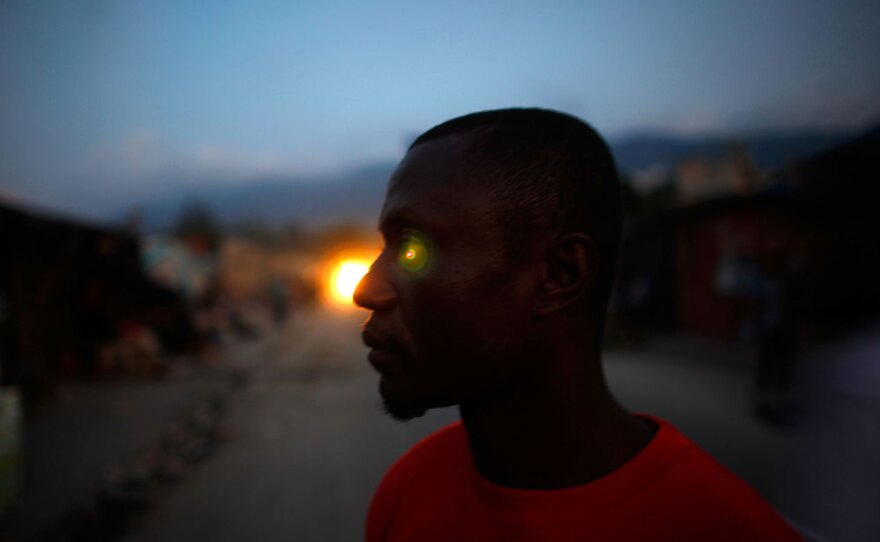Across the Haitian capital of Port-au-Prince, hundreds of thousands of people left homeless by the Jan. 12 earthquake have settled into camps. Officials say the quake victims could be in the makeshift settlements for months or even years.
Many of the camps are dangerous. Some are at risk of flooding, and landslides threaten others. Officials worry that some could be breeding grounds for disease, or that a hurricane could tear them apart.
But for the residents of one camp, the greatest threat is traffic.
South of Port-au-Prince, just over 1,000 people are living on an 8-foot-wide stretch of median in the middle of Route Nationale 2, a torn-up, six-lane road that is one of Haiti's busiest.
Motorcycles, cars, buses and trucks whiz by on either side of shacks erected in the median. Some of the shacks are made only of bedsheets wrapped around sticks with tarps stuck on top.
Lofredo Guerrier went to high school in Boston, but now he lives in one of the shacks in the middle of this road.

"Basically when it rains, we can't sleep out here. And a lot of people got kids, little babies. It's impossible for us to sleep out here," he says.
The median — just wide enough for a single structure, just wide enough for a mattress — has 326 shelters in a long thin line.
"The environment for the kids is not good. ... Look how people are living. You see how the cars are going out there real fast. Basically around here it's very dangerous," Guerrier says.
The shacks open straight into the traffic. Residents say speeding vehicles have already hit several people.
There is no electricity or running water. Women lug buckets of water from a nearby market. They bathe their children and cook over open fires at the curb, cars passing just a foot away.
What's hardest here is that we have nowhere to go. We've got to be here. And every night when we go to bed, we put our knees on the floor, raise our hands to God and say, 'God, we are in your hands because we have no other protection.'
The air is laden with thick black exhaust and reeks of sewage.
Guerrier points across three lanes of traffic to a block of portable toilets.
"It's ridiculous. And when that filled, there ain't nowhere else to go use the bathroom. When that's filled out, we are done," he says.
Everyone living in the median lost their homes in the quake. One of the reasons they settled here is that it's a no man's land.
Some people have more elaborate shacks than others. Some are made of wood with doors on hinges and windows that open. Others are crude boxes of sheet metal. The simplest are just tarps.
People want to move out of the middle of the road, but they also recognize that that might not happen for quite some time.
Rosemene Jean, 41, lives with her husband and her sister in a shelter of plastic sheeting held up by boards.
"What's hardest here is that we have nowhere to go," Jean says. "We've got to be here. And every night when we go to bed, we put our knees on the floor, raise our hands to God and say, 'God, we are in your hands because we have no other protection.' "
She says she would like move into one of the new planned camps that the government and international aid agencies are erecting, but she hears that they are all full.
Even as people say they want to leave, many residents are also putting down roots A woman in one shack sells candies, cookies and rice from her front window. Another hawks charcoal.
Some young men have opened a rudimentary bar, serving a potent moonshine called clairin from battered plastic jugs. And across the traffic, in a shed next to the portable toilets, residents can pay 25 cents to watch movies and the latest European soccer matches.
Copyright 2022 NPR. To see more, visit https://www.npr.org. 9(MDAzMjM2NDYzMDEyMzc1Njk5NjAxNzY3OQ001))

















